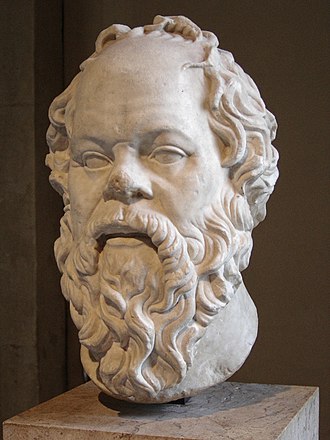Syllogism


[[File:Modus_Bamalip.svg_should_be_updated_to_add_after_line_3,_insert:_=>_∃x:_Px∧Sx_PiS_thus_some_P_is_S_[and_next_line]|Modus Bamalip should be updated to add after line 3, insert: => ∃x: Px∧Sx PiS thus some P is S [and next line]|thumb|left]]



Syllogism is a form of logical reasoning that joins two or more premises to arrive at a conclusion. The concept is a fundamental aspect of classical logic, philosophy, and mathematics, serving as a cornerstone for deductive reasoning. A syllogism is structured in a way that, if the premises are true, the conclusion must also be true. This logical structure has been studied and utilized since its inception in ancient Greece, most notably by the philosopher Aristotle, who is credited with its formalization.
Structure of a Syllogism[edit]
A typical syllogism consists of three parts: a major premise, a minor premise, and a conclusion. Each part contains a subject and a predicate, forming statements that connect the premises to the conclusion logically. The premises and the conclusion each contain two of the three terms: the major term, the minor term, and the middle term. The middle term appears in both premises but not in the conclusion, serving as a link between the major and minor terms.
Example[edit]
- Major Premise
- All mammals are animals.
- Minor Premise
- All dogs are mammals.
- Conclusion
- Therefore, all dogs are animals.
In this example, "animals" is the major term, "dogs" is the minor term, and "mammals" is the middle term.
Types of Syllogisms[edit]
Syllogisms can be categorized based on the nature of the propositions (universal, particular, affirmative, or negative) and their structure. The most common types include:
- Categorical Syllogism: Deals with categories, stating whether all, some, or no members of one category belong to another.
- Conditional Syllogism: Involves if-then statements, connecting premises conditionally to derive a conclusion.
- Disjunctive Syllogism: Based on two or more options, concluding that if one is false, the other must be true.
Rules and Fallacies[edit]
For a syllogism to be valid, it must follow certain rules, such as having a middle term that is not present in the conclusion and using the terms in a consistent manner. Violations of these rules can lead to logical fallacies, which are errors in reasoning that undermine the logical validity of the argument. Common fallacies in syllogistic reasoning include the fallacy of the undistributed middle, the fallacy of illicit major or minor, and the fallacy of four terms.
Historical and Philosophical Significance[edit]
The study of syllogisms has played a crucial role in the development of Western philosophy and logic. Aristotle's work on syllogisms, found in his Organon, particularly in the Prior Analytics, laid the groundwork for deductive reasoning. Throughout the centuries, philosophers and logicians have expanded upon, refined, and sometimes challenged Aristotle's original formulations, contributing to the evolution of logical theory and practice.
Modern Applications[edit]
Today, the principles of syllogistic reasoning are applied in various fields, including computer science, where they inform the development of artificial intelligence and algorithm design, and in law, where they are used to construct and analyze legal arguments. Despite the advent of more complex systems of logic, the syllogism remains a fundamental tool for teaching reasoning skills and for understanding the structure of arguments.

This article is a philosophy-related stub. You can help WikiMD by expanding it!
Ad. Transform your life with W8MD's Budget GLP-1 injections from $75


W8MD offers a medical weight loss program to lose weight in Philadelphia. Our physician-supervised medical weight loss provides:
- Weight loss injections in NYC (generic and brand names):
- Zepbound / Mounjaro, Wegovy / Ozempic, Saxenda
- Most insurances accepted or discounted self-pay rates. We will obtain insurance prior authorizations if needed.
- Generic GLP1 weight loss injections from $75 for the starting dose.
- Also offer prescription weight loss medications including Phentermine, Qsymia, Diethylpropion, Contrave etc.
NYC weight loss doctor appointmentsNYC weight loss doctor appointments
Start your NYC weight loss journey today at our NYC medical weight loss and Philadelphia medical weight loss clinics.
- Call 718-946-5500 to lose weight in NYC or for medical weight loss in Philadelphia 215-676-2334.
- Tags:NYC medical weight loss, Philadelphia lose weight Zepbound NYC, Budget GLP1 weight loss injections, Wegovy Philadelphia, Wegovy NYC, Philadelphia medical weight loss, Brookly weight loss and Wegovy NYC
|
WikiMD's Wellness Encyclopedia |
| Let Food Be Thy Medicine Medicine Thy Food - Hippocrates |
Medical Disclaimer: WikiMD is not a substitute for professional medical advice. The information on WikiMD is provided as an information resource only, may be incorrect, outdated or misleading, and is not to be used or relied on for any diagnostic or treatment purposes. Please consult your health care provider before making any healthcare decisions or for guidance about a specific medical condition. WikiMD expressly disclaims responsibility, and shall have no liability, for any damages, loss, injury, or liability whatsoever suffered as a result of your reliance on the information contained in this site. By visiting this site you agree to the foregoing terms and conditions, which may from time to time be changed or supplemented by WikiMD. If you do not agree to the foregoing terms and conditions, you should not enter or use this site. See full disclaimer.
Credits:Most images are courtesy of Wikimedia commons, and templates, categories Wikipedia, licensed under CC BY SA or similar.
Translate this page: - East Asian
中文,
日本,
한국어,
South Asian
हिन्दी,
தமிழ்,
తెలుగు,
Urdu,
ಕನ್ನಡ,
Southeast Asian
Indonesian,
Vietnamese,
Thai,
မြန်မာဘာသာ,
বাংলা
European
español,
Deutsch,
français,
Greek,
português do Brasil,
polski,
română,
русский,
Nederlands,
norsk,
svenska,
suomi,
Italian
Middle Eastern & African
عربى,
Turkish,
Persian,
Hebrew,
Afrikaans,
isiZulu,
Kiswahili,
Other
Bulgarian,
Hungarian,
Czech,
Swedish,
മലയാളം,
मराठी,
ਪੰਜਾਬੀ,
ગુજરાતી,
Portuguese,
Ukrainian